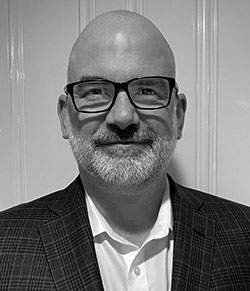Michael Cinosky, Culinary Depot
When describing his 30-plus years in foodservice, Michael Cinosky says he’s always been in kitchens. After graduating from the Culinary Institute of America in Hyde Park, N.Y., he worked in hotel and corporate foodservice.
 Michael Cinosky, Culinary Depot, Monsey, N.Y.Cinosky then opened a restaurant with a partner. “After a year, when Hurricane Sandy hit and my second daughter was born, my partner and I parted ways,” he says.
Michael Cinosky, Culinary Depot, Monsey, N.Y.Cinosky then opened a restaurant with a partner. “After a year, when Hurricane Sandy hit and my second daughter was born, my partner and I parted ways,” he says.
Fortunately, the dealership he bought his equipment from was looking for salespeople. “I decided to give it a try, and was successful right away,” Cinosky says.
Cinosky landed at Culinary Depot in 2017. Then, when asked if he could design kitchens, he found a downloadable program and went to work. “Now 30 to 40 kitchens later, here we are,” he says.
Q: How does your past experience as an operator help you now work with a client base of mostly independent operators?
A: First and foremost, I understand what it is like to work the line on the busiest nights with an inefficient layout. I can put myself in a customer’s shoes, plus I know the appropriate questions to ask, such as: How are you producing products? And: What is the volume and cooking processes? My background helps me help the chef understand how he or she is going to get from when the deliveries come in to when the plate hits the table.
Q: What steps ensure the proper design and flow of a restaurant kitchen?
A: Asking the right questions is important, and budget plays a big factor. Whether they are cooking from scratch or using frozen items makes a difference. It’s about what the customer wants and needs. It starts at the menu, and we build from there. In cases with repeat customers where there are multiple locations, we see what we can improve on for the next restaurant.
Q: Good kitchen design is not enough to make a project successful these days. What’s the key to good project coordination?
A: This question comes up so much. One thing I stress is communication and understanding what everyone’s role is. There is an old adage in construction where you measure twice and cut once. I’ve learned to measure three times, because what’s in the plan may not be the same as what’s there when it comes to construction.
Q: Bars keep playing an increasingly important role in the success of many restaurants today. What are a few elements that go into good bar design?
A: There are now mixologists behind the bar. It’s all about understanding how they’re making their drinks — similar to how food is prepared in the kitchen. Also, understand a bar setup is based on the menu. We’ve been doing modular bars exclusively lately, and some of my customers say they wouldn’t do it any other way.
Q: How can you tell when a project calls for a custom stainless-steel item versus an off-the-shelf solution?
A: We can do anything you want, but it’s about time, expense and design. It may be an application where a custom piece is required due to the configuration with refrigeration and hot wells. A lot depends on the time involved getting a custom piece, as well as the budget. There are situations where independent standard equipment can work in a space if it’s on wheels and there’s room to clean behind the units. If space is a challenge, then custom may be the only option. Each project has its own set of unique circumstances.




